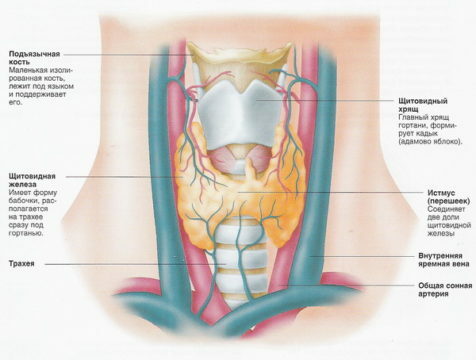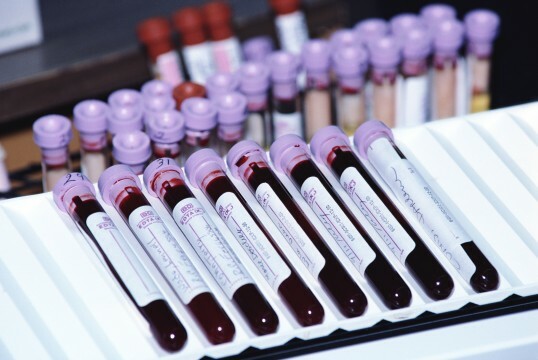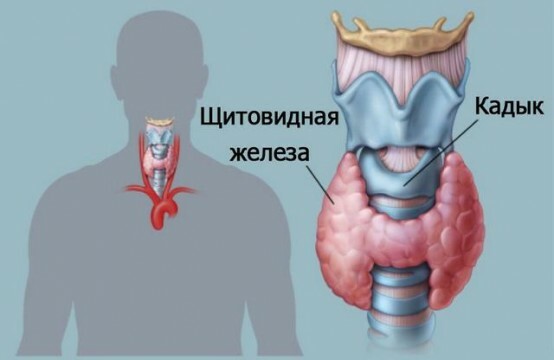Receiving the results of tests on the hands of an endocrinologist, it is difficult to understand immediately whether the indicators are normal. Decoding and diagnostics is work for a specialist, but additional control is always appropriate, especially for people with chronic diseases.
Hormone properties and biosynthesis

T4 or thyroxine free is a hormone, the definition of which is the most frequent in endocrinology practice. The development of the substance occurs in the gland itself according to a simple principle: active thyroid cells, capturing iodine and amino acids, produce a synthesis of precursors - thyroglobulin. These precursors accumulate in the gland follicles. If the body needs a thyroxine, iron releases thyroglobulin into the blood in the form of the necessary hormone.
The main function of thyroxine is the catalysis of energy release from glycogen and fat cells. The infamous practice of many women taking a thyroxine for weight loss led to an increase in pressure, arrhythmia, irritability - symptoms of an overdose of the hormone in the blood. The content of the hormone within normal limits regulates the breakdown of fats and the heartbeat for normal functioning of the body.
Blood states
When T4 is released into the blood, it is picked up by transport proteins for transfer to the area where the effect is now needed. Unrelated part remains in the minority, but it has the greatest impact on the body and is called free thyroxine. The measurement of the amount of free and bound thyroxin is called an analysis for total T4.For correct diagnosis it is best to examine the content of a free thyroxine.
Deviations in indications

Practice shows that to describe the full picture it is desirable to undergo analysis in two independent laboratories. The fact is that the sensitivity of methods and the conscientiousness of the laboratory assistant can lead to distortion of real results, which has happened more than once. If several independent studies confirm the results of each other, then you need to understand the reasons.
A decreased level of the hormone indicates a decrease in the normal function of the endocrine system and the thyroid gland in particular. This hypofunction is called hypothyroidism.
The onset of the disease can occur from other pathologies of the gland. For example, if previously there was thyrotoxicosis, which is traditionally treated with radioactive iodine. Surgery and removal of the thyroid gland also lead to abnormalities of thyroxine.
The most common cause is thyroiditis. The disease is characterized by the production of antibodies that destroy follicles with thyroglobulin. Thus, stocks are destroyed and T4 does not enter the blood.
Closed craniocerebral trauma may also be the cause of the decline, as they affect the functioning of the hypothalamus. The latter, in turn, regulates the production of thyroid hormones.
Oral contraceptives may cause thyroxine to be significantly lower than normal. Since many of these drugs also have a hormonal nature, their effect on the endocrine system manifests itself differently in each organism. Before prescribing this type of contraceptive, it is necessary to take a blood test.
Hypothyroidism can also be obtained as a result of low-protein diets or the lack of iodine-containing foods in the diet. Statistics show that this deviation is typical for people living away from the sea. Therefore, the amount of protein consumed should be normalized daily, and the amount of iodine can be replenished with enriched salt.
Symptomatics

Decrease in T4 does not pass without a trace for the body. Most often, the symptomatology is not observed at once, it can develop for months and even years, so the doctor's appointment is too late.
Common symptoms when the hormone is abnormal:
- fast fatigue,
- poor memory,
- chills,
- skin, hair, nail,
- edema of the limbs,
- unreasonable weight gain,
- malfunctions in the menstrual cycle.
These conditions should not be overlooked, since a chronic decrease in free T4 leads to a coma if not diagnosed and treated.
Diagnosis of
Detection of the hormone reading below the norm is still not sufficient reason for establishing a diagnosis. In addition, an analysis is needed for total thyroxine, also a general blood test, blood sampling for biochemistry, and ultrasound for the size of the thyroid gland.

Biochemistry is necessary to determine the amount of cholesterol in the blood, since free thyroxin is responsible for its cleavage. If the concentration of cholesterol is increased, then free T4 is below the normal range.
If additional studies confirm that the hormone content is lower than required, treatment is prescribed.
Treatment of
The body is unable to independently replace or further synthesize this substance if its values are below normal. Therefore, the basis of treatment lies with substitution therapy, in which the patient is prescribed the missing hormones.
Most often, therapy is needed throughout the rest of life, but nothing scary about it. Drugs are not dangerous for any other organs, supporting only the endocrine system.
Iodine deficiency also leads to the fact that concentrations of total and free T4 fall below normal. Therefore, iodine-containing preparations are offered as a therapy. If the course of treatment does not bring results, and the threshold of the hormone in the blood is still low, resort to the first option.
Recommendations
To prevent the imbalance of thyroid hormones, it is necessary to monitor the presence of a sufficient amount of protein and iodine in the diet. Harmful habits, oral contraceptives and head injuries can lead to deviations in indications, which eventually become chronic.
Sharp weight loss through debilitating hunger strikes and diets also leads to similar violations, while losing weight risks not only to regain the former weight, but also to redundantly recruit a new one.
Changes in the thyroid balance begin at the cellular level, so they can not be detected in time almost never. For this reason, a systematic examination of the endocrinologist and preventive fences of blood once a year will help to avoid serious health problems.



